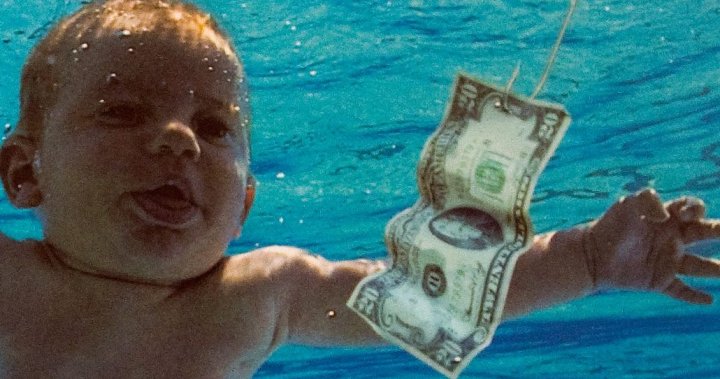
Court says ‘Nevermind’: Lawsuit against Nirvana’s naked baby cover back on
Global News
An appeals court has revived Spencer Elden’s lawsuit against Nirvana, alleging he suffered 'permanent harm' from the band's use of a naked image of him swimming in a pool.
A federal appeals court is reviving the child pornography lawsuit filed against Nirvana by a now-32-year-old man who appeared naked on the cover of the band’s 1991 album Nevermind when he was a four-month-old baby.
Spencer Elden’s lawsuit against the grunge rock group alleges that he has suffered “permanent harm” as the band and others profited from the naked image of him swimming underwater in a pool, appearing to grab for a dollar bill on a fish hook.
Elden said his parents earned a mere US$200 for the photoshoot that created the iconic album cover, which has sold over 30 million copies.
Elden first sued the band in 2021, but a federal judge in California threw out the lawsuit in 2022. A revised lawsuit was filed, but that too was dismissed on grounds that it was outside the 10-year statute of limitations on one of the laws used as a cause of action.
On Thursday, a panel of three judges on the Ninth U.S. Circuit Court of Appeals said “never mind” to that decision and ruled that Elden can move forward with his lawsuit against Nirvana. The case has been sent back to federal court in Los Angeles.
The appellate panel found that each republication of an image of child pornography “may constitute a new personal injury” with a new deadline for the statute of limitations. The court’s decision noted that the naked photo in contention was republished in 2021 when Nirvana reissued Nevermind for its 30th anniversary.
“Like victims of defamation, victims of child pornography may suffer a new injury upon the republication of the pornographic material,” the court’s decision reads.
“We conclude that each republication of child pornography can constitute a new personal injury analogous to injuries caused by defamation and other dignitary torts. This conclusion is consistent with the Supreme Court’s view that ‘every viewing of child pornography is a repetition of the victim’s abuse.’”
